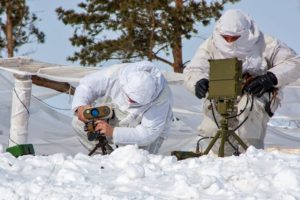Blog Editor’s Note:
Russian forces jammed GPS in northern Norway again last month. The effects were particularly felt by aviation and telecommunications. This follows a similar week-long jamming episode in the same area in September, and jamming in the Baltic later that month which disrupted cell phone service in parts of Latvia, Sweden and Norway. It also came at the same time as Russia reportedly began jamming and disabling sophisticated US weapon systems in Syria.
The jamming in Syria, an active war zone, is understandable, but why are they continuing to jam in Northern Norway?
“Routine military exercises” is always the official Russian response. Yet exercises with simulated jamming are just as effective. Lab tests, live exercises deeper inside Russia, field operations in the Ukraine and Syria – all have ensured the Russian military knows precisely how well their jamming equipment works. They have no need to disrupt and endanger Norwegian air traffic and lives to ensure military readiness.
The most likely answer is that this is a form of intimidation – both of Russia’s immediate neighbors and the larger global community.
Jamming GPS furthers a number of Russia’s national objectives:
- Denigrating the status of the United States – By revealing the fragility of GPS, “America’s gift to the world,” and how dependent other nation’s have become on it, Russia calls into question US credibility and leadership.
- Enhancing Russia’s image as a powerful nation to be feared – Jamming demonstrates Russia’s power to easily disrupt any number of first-world technologies, endanger lives, and damage economies – all without firing a shot.
- Promoting Russian technology over that of the US – Russia’s GLONASS satellite navigation system has had a troubled history and is little used across the globe, especially compared to GPS. When Russia jams GPS, signals from GLONASS are usually untouched. Russia is most active disrupting GPS signals in the Black Sea and has recently boasted of the number of ships in that area now equipped to use GLONASS signals for navigation. Russia also has a terrestrial navigation system called Chayka that is unaffected when satellite signals are jammed. It serves much of the Baltic, Black Sea, East China Sea and Sea of Japan.
- Drawing its Scandinavian and Baltic neighbors into its sphere and away from the West – Tactical jamming of the kind Russia has been doing is limited by distance. It is most effective and dangerous the closer the victim is to the source. Many politicians find it easier and more tempting, in the short term, to try to become friendlier with a belligerent neighbor than to loudly complain and enhance their own nation’s defenses. The United Kingdom, United States, China, South Korea and others have active programs to greatly reduce their security and economic dependence on satellite navigation and timing signals. It may be that Scandinavian and Baltic countries have yet to recognize the danger of satellite signals being disrupted, or are concerned about how their powerful neighbor may view such efforts.

The Independent Barents Observer
Norway requests Russia to halt GPS jamming in borderland
Intensive military training on the Russian side of the border creates increasing communications troubles for nearby Norwegians.
The Norwegian Ministry of Foreign Affairs now confirms to Aldrimer.no that it has taken contact with Russian authorities about the issue.
The concern comes as civilian aviation and communications systems have repeatedly been jammed in connection with nearby Russian military activities.
Ministry press spokesman Frode Overland Andersen confirms that there in March this year «on several occasions was reported loss of GPS signals in Eastern Finnmark», the region located along the Russian border.
The situation was similarly serious in September 2017, when airliners from companies SAS and Widerøe in periods had to navigate with the help of radio signals due to loss of GPS when they entered the East Finnmark airspace. The jamming coincided with the major Russian military exercise «Zapad».

